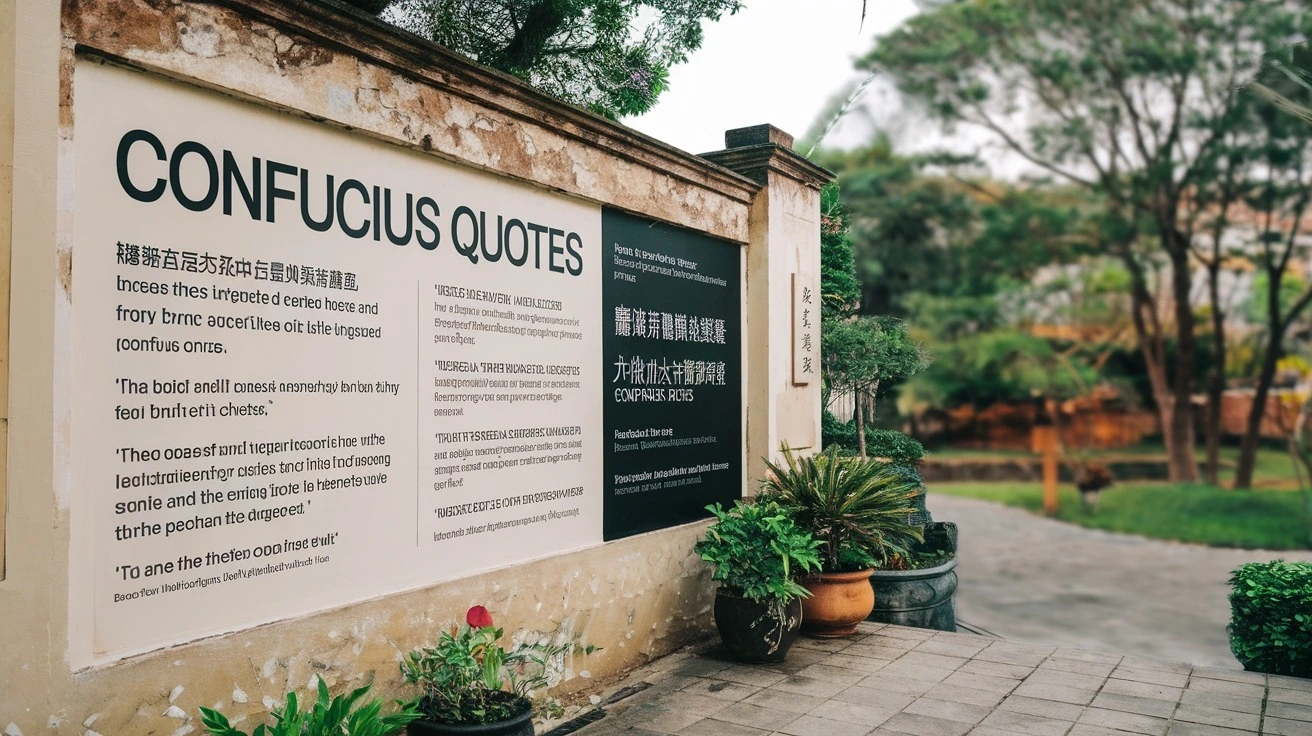This collection of Confucius Quotes delves into the core principles of his philosophy, offering insights into wisdom, morality, and self-cultivation.
Confucius, one of the most influential philosophers in Chinese history, left a profound legacy through his teachings on ethics, leadership, and personal development.
His wisdom, encapsulated in succinct and powerful quotes, continues to inspire and guide individuals seeking to lead a virtuous life.
On Wisdom and Learning
“Real knowledge is to know the extent of one’s ignorance.”
Author: Confucius
Description:
Highlights the importance of recognizing and understanding the limits of one’s knowledge.
“The superior man is modest in his speech but exceeds in his actions.”
Author: Confucius
Description:
Suggests that true nobility lies in acting with integrity and humility rather than boasting.
“Learning without thought is labor lost; thought without learning is perilous.”
Author: Confucius
Description:
Emphasizes that effective learning involves both studying and reflecting.
“To see what is right and not do it is the want of courage.”
Author: Confucius
Description:
Points out that recognizing the right action but failing to take it is a lack of bravery.
“The strength of a nation derives from the integrity of the home.”
Author: Confucius
Description:
Asserts that the moral foundation of a society is built upon strong and ethical family values.
“When we see men of a contrary character, we should turn inwards and examine ourselves.”
Author: Confucius
Description:
Suggests self-reflection as a response to observing negative traits in others.
“The more man meditates upon good thoughts, the better will be his world and the world at large.”
Author: Confucius
Description:
Highlights the impact of positive thinking on both personal and societal well-being.
“Ignorance is the night of the mind, but a night without moon and star.”
Author: Confucius
Description:
Compares ignorance to a dark, unilluminated night, suggesting a lack of guidance and clarity.
“The cautious seldom err.”
Author: Confucius
Description:
Advises that careful consideration and prudence reduce the likelihood of making mistakes.
“He who learns but does not think is lost. He who thinks but does not learn is in great danger.”
Author: Confucius
Description:
Emphasizes the need for both learning and critical thinking to avoid being misguided or unsafe.
On Virtue and Character
“The superior man is slow in his words and earnest in his conduct.”
Author: Confucius
Description:
Defines nobility as characterized by thoughtful speech and sincere actions.
“Virtue is not left to stand alone. He who practices it will have neighbors.”
Author: Confucius
Description:
Suggests that practicing virtue naturally attracts like-minded individuals.
“A man who has committed a mistake and doesn’t correct it is committing another mistake.”
Author: Confucius
Description:
Stresses the importance of correcting errors to avoid further mistakes.
“The strength of a man’s character is his greatest wealth.”
Author: Confucius
Description:
Values personal integrity and character as the most significant form of wealth.
“He who acts with a constant view to his interests will be opposed by those he seeks to benefit.”
Author: Confucius
Description:
Warns against self-serving actions that can lead to opposition from those one intends to help.
“To be wronged is nothing unless you continue to remember it.”
Author: Confucius
Description:
Advises letting go of grievances to prevent them from continuing to affect one’s life.
“When we see men of a contrary character, we should turn inwards and examine ourselves.”
Author: Confucius
Description:
Encourages self-examination when confronted with people whose behavior we find troubling.
“The cautious seldom err.”
Author: Confucius
Description:
Advises that careful and deliberate actions are less likely to result in mistakes.
“The superior man seeks what is right; the inferior man seeks what is profitable.”
Author: Confucius
Description:
Differentiates between pursuing righteousness and seeking personal gain.
“To see what is right and not do it is the want of courage.”
Author: Confucius
Description:
Defines courage as acting on what one knows to be right.
On Leadership and Governance
“A leader knows the way, goes the way, and shows the way.”
Author: Confucius
Description:
Describes effective leadership as knowing, pursuing, and guiding others in the right direction.
“He who wishes to secure the good of others has to bear the burden of others.”
Author: Confucius
Description:
Indicates that those who want to help others must also share in their challenges.
“The master said, ‘Is it not a pleasure, having learned something, to try it out at due intervals?’”
Author: Confucius
Description:
Emphasizes the joy of applying what one has learned regularly.
“To govern is to correct. If you set an example by being correct, who would dare remain incorrect?”
Author: Confucius
Description:
Suggests that leaders should exemplify correctness to encourage others to follow suit.
“He who governs by his virtue may be compared to the north star, which remains in its place while all the other stars revolve around it.”
Author: Confucius
Description:
Compares virtuous leadership to the fixed north star, which serves as a constant guide.
“If you make a mistake and do not correct it, this is called a mistake.”
Author: Confucius
Description:
Defines failing to correct mistakes as an additional error.
“A man of noble character, while recognizing the talents of others, is always improving his character.”
Author: Confucius
Description:
Highlights that a noble person appreciates others’ abilities while continually working on self-improvement.
“To lead is to serve.”
Author: Confucius
Description:
Frames leadership as an act of serving others rather than seeking personal gain.
“He who cherishes his life must be steadfast in his principles.”
Author: Confucius
Description:
Suggests that upholding one’s principles is essential for preserving one’s integrity.
“When you are laboring for others, let it be with the same zeal as if it were for yourself.”
Author: Confucius
Description:
Advocates working for others with the same dedication as if it were for oneself.
On Relationships and Humanity
“Do not do to others what you do not want done to yourself.”
Author: Confucius
Description:
Promotes empathy by advising that one should not impose on others what one would not want for oneself.
“The superior man is respectful, but does not flatter; he is reserved, but not timid.”
Author: Confucius
Description:
Describes a noble person as respectful and reserved, avoiding flattery and timidity.
“The strength of a nation derives from the integrity of the home.”
Author: Confucius
Description:
Asserts that a nation’s strength is rooted in the moral integrity of its families.
“Friendship is one mind in two bodies.”
Author: Confucius
Description:
Defines friendship as a deep, shared understanding between individuals.
“When we see men of a contrary character, we should turn inwards and examine ourselves.”
Author: Confucius
Description:
Suggests that observing negative traits in others should prompt self-reflection.
“If you want to know if someone is a friend, look at how they treat you in difficult times.”
Author: Confucius
Description:
Advises assessing the value of a friendship based on support during challenging times.
“The greatest glory is not in never falling, but in rising every time we fall.”
Author: Confucius
Description:
Values perseverance and the ability to recover from failures as true glory.
“In a country well governed, poverty is something to be ashamed of.”
Author: Confucius
Description:
This reflects the idea that in a well-governed society, poverty should be addressed as a serious issue.
“The master said, ‘Is it not a pleasure to have learned something and to try it out at due intervals?’”
Author: Confucius
Description:
Expresses the joy of periodically applying learned knowledge.
“The superior man is modest in his speech but exceeds in his actions.”
Author: Confucius
Description:
Defines nobility by thoughtful speech and meaningful actions.
On Conduct and Behavior
“To be able to practice five things everywhere under heaven constitutes perfect virtue.”
Author: Confucius
Description:
Identifies kindness, uprightness, propriety, wisdom, and sincerity as components of perfect virtue.
“The superior man is dignified but not proud; the inferior man is proud but not dignified.”
Author: Confucius
Description:
Differentiates between dignified humility and mere pride.
“Act with kindness, and you will be rewarded with trust.”
Author: Confucius
Description:
Suggests that kind actions lead to earning the trust of others.
“He who is not a good son cannot be a good man.”
Author: Confucius
Description:
Argues that filial piety is fundamental to being a virtuous person.
“He who has a clear understanding of what is right and wrong will naturally lead a correct life.”
Author: Confucius
Description:
States that understanding morality guides one’s behavior.
“One who knows how to show respect to others shows respect to himself.”
Author: Confucius
Description:
Suggests that respecting others is an indication of self-respect.
“To see and listen to the truth is a great privilege.”
Author: Confucius
Description:
Values the opportunity to understand and witness genuine truths.
“It does not matter how slowly you go as long as you do not stop.”
Author: Confucius
Description:
Encourages persistence despite the speed of progress.
“Without feelings of respect, what is there to distinguish men from beasts?”
Author: Confucius
Description:
Emphasizes respect as a key trait that distinguishes humans from animals.
“The master said, ‘Is it not a pleasure to have learned something and to try it out at due intervals?’”
Author: Confucius
Description:
Values the application of learned knowledge as a source of joy.
On Self-Cultivation and Personal Growth
“The more you know yourself, the more you understand others.”
Author: Confucius
Description:
Suggests that self-awareness enhances understanding of others.
“He who learns but does not think is lost. He who thinks but does not learn is in great danger.”
Author: Confucius
Description:
Highlights the importance of both learning and thinking for personal growth.
“The greatest glory is not in never falling, but in rising every time we fall.”
Author: Confucius
Description:
Defines true greatness as the ability to rise after each failure.
“To practice five things everywhere under heaven constitutes perfect virtue.”
Author: Confucius
Description:
Identifies key virtues essential for personal growth and perfection.
“He who cherishes his life must be steadfast in his principles.”
Author: Confucius
Description:
Emphasizes the importance of upholding principles for a meaningful life.
“To be wronged is nothing unless you continue to remember it.”
Author: Confucius
Description:
Advises letting go of past wrongs to prevent them from affecting future well-being.
“A person who has committed a mistake and doesn’t correct it is committing another mistake.”
Author: Confucius
Description:
Stresses the importance of correcting errors to avoid compounding them.
“The superior man seeks what is right; the inferior man seeks what is profitable.”
Author: Confucius
Description:
Differentiates between pursuing righteousness and personal gain.
“He who wishes to secure the good of others has to bear the burden of others.”
Author: Confucius
Description:
Indicates that helping others requires sharing in their difficulties.
“Self-cultivation is the key to personal development and moral excellence.”
Author: Confucius
Description:
Views self-improvement as crucial for achieving moral and personal growth.
On Ethics and Morality
“The master said, ‘Is it not a pleasure to have learned something and to try it out at due intervals?’”
Author: Confucius
Description:
Expresses the joy of applying knowledge periodically.
“To govern is to correct. If you set an example by being correct, who would dare remain incorrect?”
Author: Confucius
Description:
Suggests that effective governance involves setting a moral example.
“The cautious seldom err.”
Author: Confucius
Description:
Advises that careful and deliberate actions are less likely to result in mistakes.
“Virtue is not left to stand alone. He who practices it will have neighbors.”
Author: Confucius
Description:
Suggests that practicing virtue naturally attracts like-minded people.
“He who has committed a mistake and doesn’t correct it is committing another mistake.”
Author: Confucius
Description:
Highlights the importance of addressing and correcting mistakes.
“A man who has committed a mistake and doesn’t correct it is committing another mistake.”
Author: Confucius
Description:
Emphasizes correcting errors as a part of ethical behavior.
“The superior man seeks what is right; the inferior man seeks what is profitable.”
Author: Confucius
Description:
Differentiates between pursuing righteousness and seeking personal gain.
“Self-cultivation is the key to personal development and moral excellence.”
Author: Confucius
Description:
Views self-improvement as essential for moral and personal growth.
“The greatest glory is not in never falling, but in rising every time we fall.”
Author: Confucius
Description:
Defines true glory as the ability to recover from failures.
“Without feelings of respect, what is there to distinguish men from beasts?”
Author: Confucius
Description:
Emphasizes respect as a defining characteristic of humanity.
On Social Harmony and Justice
“To see what is right and not do it is the want of courage.”
Author: Confucius
Description:
Defines courage as the act of doing what is right when one sees it.
“The master said, ‘Is it not a pleasure to have learned something and to try it out at due intervals?’”
Author: Confucius
Description:
Expresses the joy of applying knowledge periodically.
“The strength of a nation derives from the integrity of the home.”
Author: Confucius
Description:
Asserts that a nation’s strength is rooted in strong and ethical family values.
“He who cherishes his life must be steadfast in his principles.”
Author: Confucius
Description:
Emphasizes the importance of adhering to principles for a fulfilling life.
“The master said, ‘Is it not a pleasure to have learned something and to try it out at due intervals?’”
Author: Confucius
Description:
Reflects the satisfaction of applying learned principles.
“To be wronged is nothing unless you continue to remember it.”
Author: Confucius
Description:
Advises that letting go of past wrongs is important for personal peace.
“The superior man is modest in his speech but exceeds in his actions.”
Author: Confucius
Description:
Defines nobility by the balance of reserved speech and impactful actions.
“The master said, ‘Is it not a pleasure to have learned something and to try it out at due intervals?’”
Author: Confucius
Description:
Expresses the joy of practicing what one has learned.
“The greatest glory is not in never falling, but in rising every time we fall.”
Author: Confucius
Description:
Celebrates the resilience to rise after failures.
“Without feelings of respect, what is there to distinguish men from beasts?”
Author: Confucius
Description:
Emphasizes that respect is what differentiates humans from animals.
On Self-Improvement and Personal Development
“The superior man is modest in his speech but exceeds in his actions.”
Author: Confucius
Description:
Defines a noble person by their modest speech and outstanding actions.
“The more man meditates upon good thoughts, the better will be his world and the world at large.”
Author: Confucius
Description:
Highlights the positive impact of maintaining good thoughts on personal and global levels.
“The cautious seldom err.”
Author: Confucius
Description:
Advises that careful consideration prevents mistakes.
“The greatest glory is not in never falling, but in rising every time we fall.”
Author: Confucius
Description:
Values resilience and the ability to recover from setbacks.
“To practice five things everywhere under heaven constitutes perfect virtue.”
Author: Confucius
Description:
Lists kindness, uprightness, propriety, wisdom, and sincerity as essential virtues.
“He who wishes to secure the good of others has to bear the burden of others.”
Author: Confucius
Description:
Indicates that helping others involves sharing in their burdens.
“To be wronged is nothing unless you continue to remember it.”
Author: Confucius
Description:
Suggests that forgetting past wrongs is necessary for peace of mind.
“Self-cultivation is the key to personal development and moral excellence.”
Author: Confucius
Description:
Views ongoing self-improvement as crucial for personal and moral growth.
“The superior man seeks what is right; the inferior man seeks what is profitable.”
Author: Confucius
Description:
Differentiates between pursuing righteousness and personal gain.
“He who learns but does not think is lost. He who thinks but does not learn is in great danger.”
Author: Confucius
Description:
Highlights the importance of combining learning with reflection for growth.
On Conduct and Behavior
“To be able to practice five things everywhere under heaven constitutes perfect virtue.”
Author: Confucius
Description:
Identifies the practice of key virtues as essential for perfect virtue.
“He who cherishes his life must be steadfast in his principles.”
Author: Confucius
Description:
Emphasizes adherence to principles for a meaningful life.
“The master said, ‘Is it not a pleasure to have learned something and to try it out at due intervals?’”
Author: Confucius
Description:
Expresses the joy in applying learned knowledge.
“He who is not a good son cannot be a good man.”
Author: Confucius
Description:
Asserts that filial piety is the foundation of virtuous character.
“The greatest glory is not in never falling, but in rising every time we fall.”
Author: Confucius
Description:
Celebrates resilience and the ability to rise after failure.
“Self-cultivation is the key to personal development and moral excellence.”
Author: Confucius
Description:
Views self-improvement as central to personal and moral growth.
“The superior man seeks what is right; the inferior man seeks what is profitable.”
Author: Confucius
Description:
Differentiates between pursuing righteousness and personal gain.
“The strength of a nation derives from the integrity of the home.”
Author: Confucius
Description:
Suggests that strong family values contribute to a nation’s strength.
“The master said, ‘Is it not a pleasure to have learned something and to try it out at due intervals?’”
Author: Confucius
Description:
Values the application of learned knowledge as a source of joy.
“The superior man is modest in his speech but exceeds in his actions.”
Author: Confucius
Description:
Defines nobility by thoughtful speech and meaningful actions.










